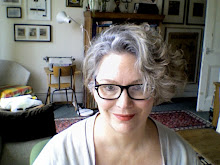a book for what ails us
Blake Morrison, in today's Guardian, talks about the powers of literature to heal. In reference to an initiative around Merseyside called "Get Into Reading" he describes what sound like miracles - patients on less medication, people improving as people, people recovering from bereavements and - of course I like this one - vocabularies improving. Participants include the homeless, the bipolar and the bereaved, as well as people in chronic pain and those with cancer and other long-term illnesses.
The key to this initiative, as with any initiative I think, is the vision of the woman who set it up - in this case, Jane Davis from the University of Liverpool's Reader Centre. I have been professionally involved, no matter how tangentially, with more badly-thought-out initiatives by people who had no idea what they were doing than I care to mention. The debris of these schemes is everywhere around us, often in the form of non-functioning human beings. Indeed, Morrison's article describes, depressingly, people being sent to the local library by well-meaning "service providers" only to find the place empty save for a few leaflets and self-help books on depression.
In fact, according to Morrison, it is precisely the books on depression - and anything else self-consciously "positive" or "life-affirming" (my words) - which will do least to help someone in extremis. It is the example, and the company (as it were) of the author's darkest moments that can most help to lead the reader through his or her own darkness, and safely out the other side. Groups cited were reading Shakespeare, Dickens, Hardy.
Morrison quotes Ted Hughes defining poetry, for example, as "nothing more than a facility for expressing that complicated process in which we locate, and attempt to heal, affliction - whether our own or that of others whose feeling we can share. The inmost spirit of poetry, in other words, is at bottom, in every recorded case, the voice of pain - and the physical body, so to speak, of poetry, is the treatment by which the poet tries to reconcile that pain with the world."
It's both interesting and refreshing that these schemes are so effective specifically with poetry. There's a story of one old woman who refused to talk or listen to anyone, but who softened gradually while poetry was read aloud. And it's equally interesting that the reading lists for these successful groups are probably more demanding than your average A Level. Dumbing down really does make us dumb.
Meanwhile, in Comment is Free, talking rather more glamorously of the power of award committees, etc, Mark Lawson happens to mention that literary fiction is failing because the marketing departments don't like it, and that its traditional haven - the library system - has been given over to DVDs and - again - those leaflets. This would seem to run counter to the insights of Blake Morrison's wonderful article.
Do we think it would be good to see some lateral thinking, as several local authorities are named as falling down on this score? (And even they are the GOOD ones, as most would never think of trying to harness literature and the inner life in aid of the work of the social services.) Tower Hamlets Council, while I was working there, revamped its libraries into "Idea Stores" which look glitzy, with big glass windows, but when you look inside them you can't see a single book (though their website says they carry "a wide range of stock including best-selling [sic] books, CDs and DVDs"). They had banks of computers... leaflets... you know... not an idea in sight.
And yet - and yet - Morrison also describes George Eliot getting over the loss of her husband by reading Dante with her friend John Cross. She subsequently married him. Would that have happened if she had met him down the Idea Store and looked Dante up on Wikipedia with him sitting on a couple of tall stools, cans of diet Coke at their elbows? "Her sympathetic delight in stimulating my newly awakened enthusiasm for Dante did something to distract her mind from sorrowful memories," Cross later wrote. "The divine poet took us to a new world. It was a renovation of life."
Anyway, no literature can cure the cold I have had since November. Every time I think I'm getting better, I wake up one morning with a terrible throat or no voice or a hacking cough. I'm writing this lying in bed, unable to swallow properly, with eyes that feel like they're popping out of my head, which in the case of my left one may in fact be the case. However, deadlines demand that I try a "writing cure" - maybe THAT will fix me.












2 comments:
At the risk of niggling, Eliot hadn't lost her husband, had she? She and Lewes never were able to marry, because he could not secure a divorce. They certainly lived together as man and wife and thought of themselves as a permanent couple, but she was legally unwed until she married Cross--and promptly died later the same year (only a case of post hoc ergo propter hoc, let us hope).
What is this cold? I've had it too, since before Christmas. It comes, it goes, it changes form, it roams the body, it sneaks back up to surprise me just when I think it's almost gone... And the only cure I can allow myself is an exam-writing one, for Monday... Help! Atishoo.
Post a Comment